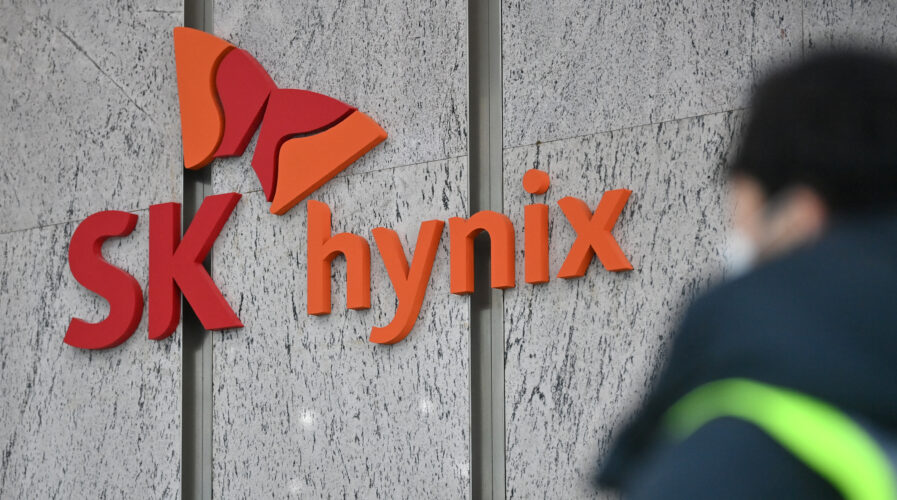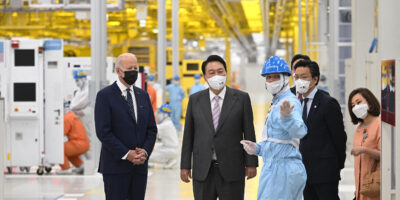
The US allows SK Hynix a year of access to chip equipment for factories in China . (Photo by Jung Yeon-je / AFP)
South Korean companies allocating billions to boost semiconductor, biotech
- SK Group plans to invest 247 trillion won (US$195 billion) in key growth sectors such as semiconductors, batteries and biotechnology over the next five years.
- Almost 60% of the total spending, through 2026, is for establishing a local semiconductor ecosystem.
- About 67.4 trillion won will go into its green energy business, including EV batteries, while 24.9 trillion won will be spent on advancing digital technologies such as 5G networks.
Just days after South Korean conglomerate the Samsung Group pledged to spend 450 trillion won (US$356 billion) — 30% more than its previous five-year allocation — to shore up businesses in semiconductors, biopharmaceutical and other next-generation technologies, its rival SK Group also announced a massive expenditure, focusing on similar key growth areas.
The group, also South Korea’s second-largest conglomerate after Samsung, has allocated 247 trillion won (US$195 billion) for the next five years, targeting key growth sectors such as semiconductors, batteries and biotechnology. SK Group, which owns the world’s second-largest memory chipmaker SK Hynix Inc., said 142.2 trillion won, or nearly 60% of the total spending, through 2026, is earmarked for establishing a local semiconductor ecosystem.
The ecosystem includes the launch of a chip cluster, expansion of chip fabrication facilities and increased purchase of chipmaking equipment. In a statement, the conglomerate highlighted that the chip cluster would be in Yongin, south of Seoul, to accommodate over 50 local manufacturers and suppliers of semiconductor materials, components and equipment.
“At the center of the Fourth Industrial Revolution such as digital transformation and artificial intelligence lie semiconductors. Chips are our future.” From the rest of the allocation, 67.4 trillion won will go into its green energy business, including electric vehicle (EV) batteries, while 24.9 trillion won will be spent on advancing digital technologies such as 5G networks.
SK Group also aims to reduce carbon emissions by 200 million tons, or about 1% of the worldwide initiative to cut emissions by 2.1 billion tons as of 2030. The target aligns with the initiative — renewable energy 100 (RE100) initiative — SK Group is a part of since November 2020.
SK Group said the remaining 12.7 trillion won will be used for expanding its pharmaceutical business. Basically, SK Group aims to enhance its presence in the business of drug-making for other companies under contract development and manufacturing organization (CDMO) programs.
Of the total investment, domestic investment alone amounts to 179 trillion won, or 73%. “This investment will contribute to revitalizing the national economy,” SK Group said, adding that the company also decided to hire 50,000 people in South Korea over the next five years.
Samsung also had indicated that the bulk of their expenditure would go to enhancing the chipmaker’s system memory and foundry capacity. To put it simply, the tech giant will spend 360 trillion won at home to create 80,000 jobs, a sharp increase from last year’s pledge of 240 trillion won for the following three years of which 180 was devoted to shore up 40,000 jobs in South Korea.
READ MORE
- 3 Steps to Successfully Automate Copilot for Microsoft 365 Implementation
- Trustworthy AI – the Promise of Enterprise-Friendly Generative Machine Learning with Dell and NVIDIA
- Strategies for Democratizing GenAI
- The criticality of endpoint management in cybersecurity and operations
- Ethical AI: The renewed importance of safeguarding data and customer privacy in Generative AI applications


